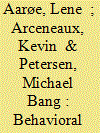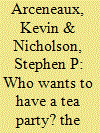|
|
|
Sort Order |
|
|
|
Items / Page
|
|
|
|
|
|
|
| Srl | Item |
| 1 |
ID:
153780


|
|
|
|
|
| Summary/Abstract |
We present, test, and extend a theoretical framework that connects disgust, a powerful basic human emotion, to political attitudes through psychological mechanisms designed to protect humans from disease. These mechanisms work outside of conscious awareness, and in modern environments, they can motivate individuals to avoid intergroup contact by opposing immigration. We report a meta-analysis of previous tests in the psychological sciences and conduct, for the first time, a series of tests in nationally representative samples collected in the United States and Denmark that integrate the role of disgust and the behavioral immune system into established models of emotional processing and political attitude formation. In doing so, we offer an explanation for why peaceful integration and interaction between ethnic majority and minorities is so hard to achieve.
|
|
|
|
|
|
|
|
|
|
|
|
|
|
|
|
| 2 |
ID:
116470


|
|
|
|
|
| Publication |
2012.
|
| Summary/Abstract |
In the wake of the 2008 election, disgruntled conservatives organized opposition to President Obama's policies under a new movement dubbed the Tea Party. As an emerging force in American politics, we seek to understand who supports the Tea Party and the political attitudes these individuals hold. Using a nationally representative survey of respondents during the 2010 midterm elections, we examine whether the emerging narrative surrounding the Tea Party is accurate. The survey included a novel embedded experiment designed to investigate claims that animosity toward racial minorities drives Tea Party opposition to welfare. We find support for the contention that the Tea Party is predominately white, male, conservative, and strongly opposed to tax increases. Tea Party supporters, however, are not simply libertarians. In spite of appeals to freedom and liberty common in Tea Party rhetoric, a strong authoritarian pulse exists among its most ardent supporters. Furthermore, although we find evidence that racial resentment colors Tea Party members' judgments about government aid to the poor, racial animus does not appear to be the primary force behind their opposition to government aid. Lastly, we uncover some evidence of heterogeneity within the movement, with a small minority of Tea Party supporters voicing less-extreme political attitudes and evincing a rejection of negative racial stereotypes.
|
|
|
|
|
|
|
|
|
|
|
|
|
|
|
|
|
|
|
|
|